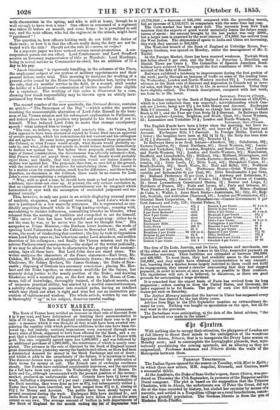The second number of the new quarterly, the National Review,
contains an article—" The Statesmen of the Day "—which settles the question touching the unaccountable aberration of Lord John Russell in the busi- ness of his Vienna mission and his subsequent explanation in Parliament, and indeed places him in a position very painful to his friends if not to himself. What induced Lord John to make that strange exculpatory speech ? what induced him to resign ? "The case, we believe, was simply and concisely this. At Vienna, Lord John appears to have been alarmed or cajoled by Count Buol into an approval of certain proposals, which his instructions did not warrant and his colleagues did not agree to. He came home, prepared to recommend these proposals to the Cabinet, as what France would accept, what Russia would probably ac- cede to, and what, if she did not accede to, would induce Austria immediately to declare war against her. But before these proposals could become the topic of formal consideration, the Government was officially informed—first, that France would not accept them; secondly, that Russia would probably reject them ; and thirdly, that this rejection would not induce Austria to declare war against her. The proposals, therefore, at once fell to the ground, with the removal of all the motives for entertaining them. . They ceased to be a matter even for consideration, much less for difference ; and there being, therefore, no dissension in the Cabinet, there could be no reason for Lord John's even contemplating a resignation.
" Why, with so good a case, he should have made so bad and so irrelevant a defence, time alone can clear up. At present, the only certain conclusion is, that no explanation of his marvellous misstatement can be imagined which harmonizes at once with the assumption of unclouded judgment and un- stained veracity."
This, however, is only one point in an article displaying unusual power of analysis, eloquence, and compact reasoning. Lord John's whole ca- reer is portrayed in a few masterly sentences. He is represented as cre- ditably acquitting himself while in Whig leading-strings; running wild, succumbing to sinister influences, committing blunder on blunder, when released from the nursing of tradition and compelled to act for himself. "His career of late has been both painful and perplexing : either he is not the man he was, or he never was the man we thought him." His escapades as Prime Minister,—the Durham letter business ; the mode of ejecting Lord Palmerston from the Cabinet in December 1851, and, still worseLthe mode of vindicating that conduct ; the line he took in Opposition when Lord Derby came in ; his behaviour under Lord Aberdeen, and sudden desertion of his colleagues; and finally the Vienna mission and its dis- astrous Parliamentary consequences,—the scalpel of the writer judicially, if we may be allowed the term to characterize the gravity of the anatomi- zation, lays all these bare. But Lord John does not stand alone. The writer analyzes the characters of the Peace statesmen—Earl Grey, Mr. Cobden, Mr. Bright, all carefully, considerately drawn ; the seceders—Mr. Gladstone, Mr. Sidney Herbert, Sir James Graham ; the Duke of New- castle ; disposing of Graham in a summary conviction ; placing Mr. Her- bert and the Duke together, as statesmen available for the future, but scarcely doing justice to the manly position of the Duke; and drawing Gladstone with a masterly pen, as the first man in the House of Com- mons, full of knowledge, thoroughly trained, of the highest morale, and of immense practical ability, but marred by a morbid conscientiousness, a subtilty cheating its possessor into crooked paths, having an intellect which may think out what is right and wise but not an instinctive per- ception of rightness and wisdom. The whole article, written by one who is thoroughly " up " in his subject, deserves careful reading.


























 Previous page
Previous page